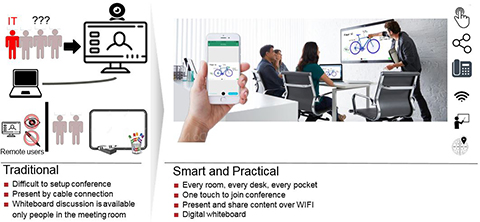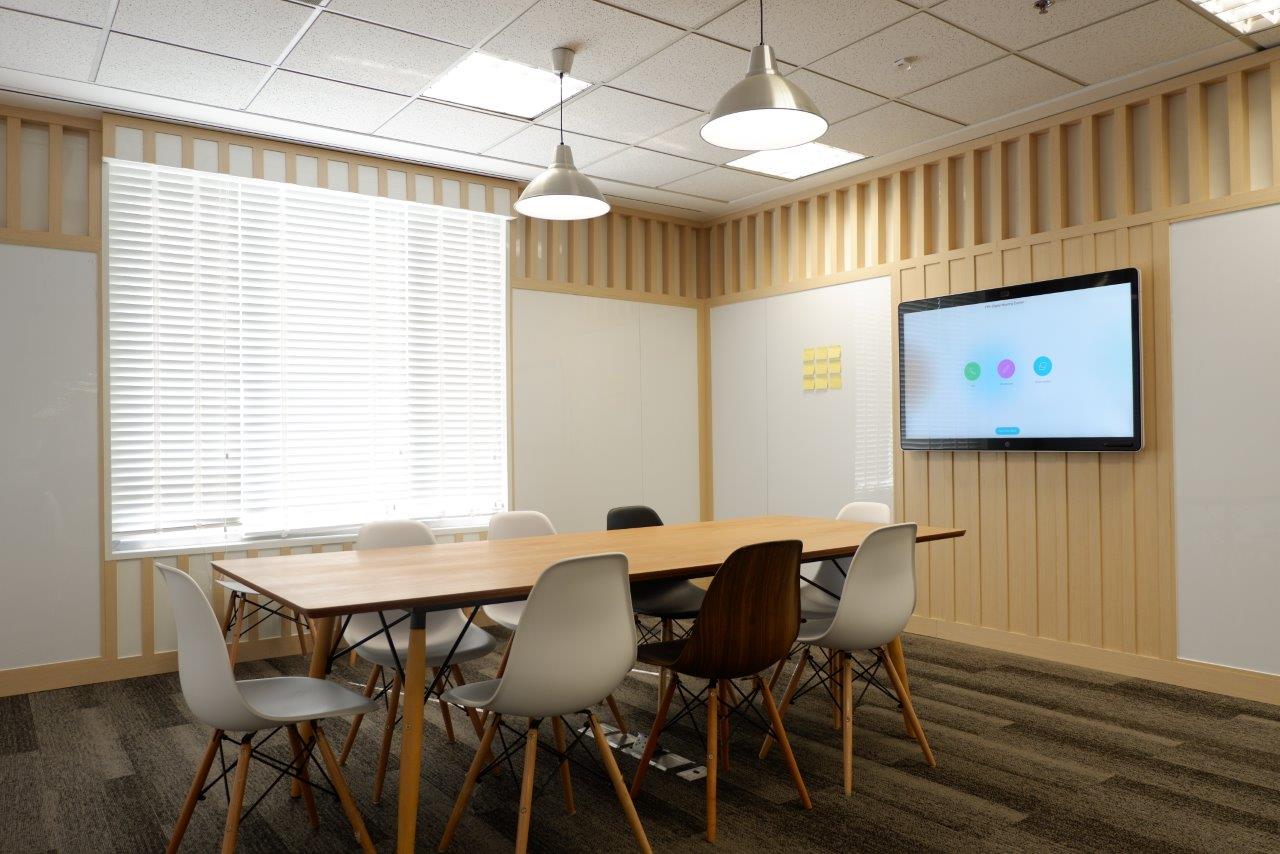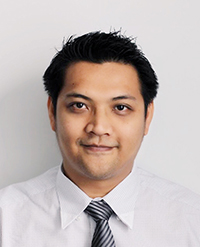How Fujitsu Thailand is transforming its workplace
Putting transformation theory into practice
 Meeting room experience improvement
Meeting room experience improvement
Fujitsu Thailand is on the cutting edge of workplace transformation and has recently conducted a comprehensive survey of Thai workers to understand what attracts young, skilled workers to companies. This led to a clearer understanding of what companies need to transform to become more competitive and successful. Accordingly, Fujitsu Thailand began to investigate ways to improve its own workplace with regard to collaboration and co-creation.
Fujitsu Thailand has a geographically-dispersed team in Thailand, while team members also work closely with people from other Fujitsu offices globally. The teams communicated regularly but could only collaborate via audio conferences.
This was highly limiting, because sharing documents or presentations meant the meeting leader had to manually send the presentation or documents to each person invited to the meeting. This clogged up email servers and meant that meeting participants had to manually follow along with the presentation. The presenter would advise that the presentation page was changing and the phone-based attendees would then click to the next page.
This inhibited free and creative collaboration, stopping the Fujitsu teams in Thailand and globally from reaching their full potential.
Consequently, Fujitsu Thailand set up a Smart Workplace project, led by a working team comprised of the HR department, the IT department, and the Digital Innovation team, led by Sakon Khiewlamyong. The group studied Fujitsu Thailand’s requirements and prioritised them before proposing a solutions roadmap and budget. This process mirrored the one used by Fujitsu Thailand for its own customers.
Identifying the challenge
Fujitsu Thailand has a geographically-dispersed team in Thailand, while team members also work closely with people from other Fujitsu offices globally. The teams communicated regularly but could only collaborate via audio conferences.
This was highly limiting, because sharing documents or presentations meant the meeting leader had to manually send the presentation or documents to each person invited to the meeting. This clogged up email servers and meant that meeting participants had to manually follow along with the presentation. The presenter would advise that the presentation page was changing and the phone-based attendees would then click to the next page.
This inhibited free and creative collaboration, stopping the Fujitsu teams in Thailand and globally from reaching their full potential.
Consequently, Fujitsu Thailand set up a Smart Workplace project, led by a working team comprised of the HR department, the IT department, and the Digital Innovation team, led by Sakon Khiewlamyong. The group studied Fujitsu Thailand’s requirements and prioritised them before proposing a solutions roadmap and budget. This process mirrored the one used by Fujitsu Thailand for its own customers.
Creating the digital meeting corner

Fujitsu Thailand started its workplace transformation by revolutionising the way team members meet and collaborate. The team created a digital meeting corner that combines web and video conference capabilities, a digital whiteboard, and Wi-Fi presentation.
The three-phase transformation includes a physical renovation of the interior design of the meeting room, which marks it as unique in the Fujitsu Thailand office. All the walls are whiteboards, which lets staff write ideas on any wall, while the design aims to create a cosy and inviting feel that encourages creativity.
The first phase of the project brings all Fujitsu staff together in a virtual team workplace using Cisco WebEx Team. In this virtual workplace, Fujitsu team members can share ideas, information, and files, and conference with each other at any time.
Furthermore, Fujitsu Thailand installed video conference devices in every meeting room in each of its four locations. This lets staff do a web or video conference at any time. Some of these meeting rooms include digital whiteboards and Wi-Fi presentation capabilities.
The second phase will include a meeting room reservation system which will make it easier and faster to find and book meeting rooms based on the requirements of each meeting. Fujitsu Thailand will also add Internet of Things (IoT) sensors and devices in some meeting rooms to control the lights in the room. This will reduce energy consumption and keep lighting at an optimal level during meetings.
In this phase, Fujitsu Thailand will also deploy more digital whiteboards and integrate a landline phone system to the Cisco WebEx Team. This will help increase staff mobility as everyone will be able to use their smartphone to make calls from anywhere in the world as if they’re being made from an internal phone. The call will be charged as an internal call and won’t be charged mobile rates. This saves money for the organization and gives staff members the mobility they crave.
The second phase will also see a more comprehensive renovation of the Fujitsu Thailand offices to make them more modern and attractive for new staff members.
Since implementing the digital meeting rooms, Fujitsu Thailand has noticed that staff prefer to use videoconferencing instead of travelling to meet onsite. This helps save on travel costs and it also saves time, since staff don’t spend any time in transit.
Furthermore, being able to share ideas on the digital whiteboard makes collaboration more effective. Even staff members who aren’t in the office can contribute their ideas and have them appear on the whiteboard that’s in the office, so everyone is literally on the same page. Collaborating more effectively has increased productivity and teamwork.
Importantly, Fujitsu Thailand staff members can now collaborate just as effectively with team members whether they’re in the office or halfway around the world. This fulfils the mobility capabilities demanded by today’s younger workers.
It also helps Fujitsu Thailand work more effectively with outside stakeholders, as the team can invite vendors and customers to work together in the virtual space as well.
Alongside modern, sophisticated collaboration tools, the office renovation will contribute to an overarching impression of Fujitsu Thailand as a desirable place to work for older and younger generations alike.
At Fujitsu, we are world-leading experts in digital business transformation. We have in-depth knowledge of workplace trends and experience as a solutions integrator. We believe that digital co-creation is the fastest and most effective route to innovation and growth. Contact us to find out how our digital workplace solutions can transform your business and empower your employees.
The three-phase transformation includes a physical renovation of the interior design of the meeting room, which marks it as unique in the Fujitsu Thailand office. All the walls are whiteboards, which lets staff write ideas on any wall, while the design aims to create a cosy and inviting feel that encourages creativity.
The first phase of the project brings all Fujitsu staff together in a virtual team workplace using Cisco WebEx Team. In this virtual workplace, Fujitsu team members can share ideas, information, and files, and conference with each other at any time.
Furthermore, Fujitsu Thailand installed video conference devices in every meeting room in each of its four locations. This lets staff do a web or video conference at any time. Some of these meeting rooms include digital whiteboards and Wi-Fi presentation capabilities.
The second phase will include a meeting room reservation system which will make it easier and faster to find and book meeting rooms based on the requirements of each meeting. Fujitsu Thailand will also add Internet of Things (IoT) sensors and devices in some meeting rooms to control the lights in the room. This will reduce energy consumption and keep lighting at an optimal level during meetings.
In this phase, Fujitsu Thailand will also deploy more digital whiteboards and integrate a landline phone system to the Cisco WebEx Team. This will help increase staff mobility as everyone will be able to use their smartphone to make calls from anywhere in the world as if they’re being made from an internal phone. The call will be charged as an internal call and won’t be charged mobile rates. This saves money for the organization and gives staff members the mobility they crave.
The second phase will also see a more comprehensive renovation of the Fujitsu Thailand offices to make them more modern and attractive for new staff members.
Seeing the benefits
Since implementing the digital meeting rooms, Fujitsu Thailand has noticed that staff prefer to use videoconferencing instead of travelling to meet onsite. This helps save on travel costs and it also saves time, since staff don’t spend any time in transit.
Furthermore, being able to share ideas on the digital whiteboard makes collaboration more effective. Even staff members who aren’t in the office can contribute their ideas and have them appear on the whiteboard that’s in the office, so everyone is literally on the same page. Collaborating more effectively has increased productivity and teamwork.
Importantly, Fujitsu Thailand staff members can now collaborate just as effectively with team members whether they’re in the office or halfway around the world. This fulfils the mobility capabilities demanded by today’s younger workers.
It also helps Fujitsu Thailand work more effectively with outside stakeholders, as the team can invite vendors and customers to work together in the virtual space as well.
Alongside modern, sophisticated collaboration tools, the office renovation will contribute to an overarching impression of Fujitsu Thailand as a desirable place to work for older and younger generations alike.
Co-creation for success with Fujitsu
At Fujitsu, we are world-leading experts in digital business transformation. We have in-depth knowledge of workplace trends and experience as a solutions integrator. We believe that digital co-creation is the fastest and most effective route to innovation and growth. Contact us to find out how our digital workplace solutions can transform your business and empower your employees.
Explore our offerings
Sakon Khiewlamyong
Smart Workplace Specialist,
Fujitsu (Thailand) Co., Ltd.
Sakon is a Smart Workplace specialist and member of Fujitsu Thailand’s new pioneering team focused on digital innovation. He has more than 15 years’ background in network and security designing, consulting, supporting, and troubleshooting. Sakon is focused on supporting customers for digital transformation that helps them meet business goals.





